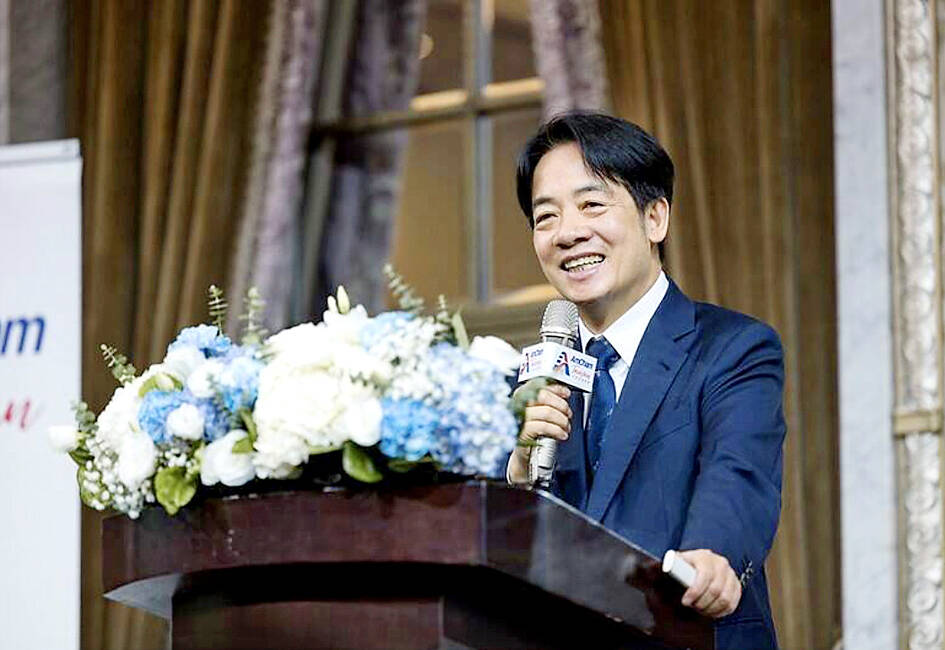The American Chamber of Commerce (AmCham) in Taiwan on Saturday said it looks forward to collaborating closely with president-elect William Lai’s (賴清德) administration, after the vice president won the presidential election.
AmCham also aims to work toward eliminating trade barriers between the US and Taiwan, as well as improving regulatory and supervisory environments to enhance Taiwan’s competitiveness, the chamber said in a statement.
Faced with global geopolitical changes, Taiwan should seize this golden moment of international goodwill to bolster its economy and firmly establish itself on the international stage, it said.

Photo courtesy of the American Chamber of Commerce in Taiwan
The victory of Lai and his running mate, Hsiao Bi-Khim (蕭美琴) gives the Democratic Progressive Party a mandate to lead Taiwan for the next four years.
“We have confidence in the crucial relationship between the American and Taiwanese people, believing that under the new government’s leadership, this relationship will continue to thrive,” the statement quoted AmCham chairman Dan Silver as saying.
“This not only marks Taiwan’s eighth direct presidential election, but also heralds the fourth decade for Taiwan’s democracy. It reminds us that shared values are the driving force behind the lasting relationship between the people of the United States and Taiwan,” Silver said.
Following the progress made in negotiations under the US-Taiwan Initiative on 21st-Century Trade framework last year, the chamber looks forward to the two sides reaching a swift agreement on the remaining areas being negotiated, it said.
“It is our hope that the implementation of the agreements will have a lasting impact, leading to discussions on a comprehensive bilateral trade agreement between Taiwan and the United States,” AmCham said.
It also supports Taiwan and the US signing a double taxation avoidance agreement to facilitate trade and bilateral investment, it said.
AmCham expressed its gratitude to President Tsai Ing-wen (蔡英文) and her administration for maintaining an open attitude toward industry and issues raised by the chamber over the past eight years.
It encourages the incoming administration to continue robust communication with AmCham, to ensure that international businesses maintain confidence in continuing and expanding their operations and investments in Taiwan, it said.

UNCERTAINTY: Innolux activated a stringent supply chain management mechanism, as it did during the COVID-19 pandemic, to ensure optimal inventory levels for customers Flat-panel display makers AUO Corp (友達) and Innolux Corp (群創) yesterday said that about 12 to 20 percent of their display business is at risk of potential US tariffs and that they would relocate production or shipment destinations to mitigate the levies’ effects. US tariffs would have a direct impact of US$200 million on AUO’s revenue, company chairman Paul Peng (彭雙浪) told reporters on the sidelines of the Touch Taiwan trade show in Taipei yesterday. That would make up about 12 percent of the company’s overall revenue. To cope with the tariff uncertainty, AUO plans to allocate its production to manufacturing facilities in

Taiwan will prioritize the development of silicon photonics by taking advantage of its strength in the semiconductor industry to build another shield to protect the local economy, National Development Council (NDC) Minister Paul Liu (劉鏡清) said yesterday. Speaking at a meeting of the legislature’s Economics Committee, Liu said Taiwan already has the artificial intelligence (AI) industry as a shield, after the semiconductor industry, to safeguard the country, and is looking at new unique fields to build more economic shields. While Taiwan will further strengthen its existing shields, over the longer term, the country is determined to focus on such potential segments as

Chizuko Kimura has become the first female sushi chef in the world to win a Michelin star, fulfilling a promise she made to her dying husband to continue his legacy. The 54-year-old Japanese chef regained the Michelin star her late husband, Shunei Kimura, won three years ago for their Sushi Shunei restaurant in Paris. For Shunei Kimura, the star was a dream come true. However, the joy was short-lived. He died from cancer just three months later in June 2022. He was 65. The following year, the restaurant in the heart of Montmartre lost its star rating. Chizuko Kimura insisted that the new star is still down

While China’s leaders use their economic and political might to fight US President Donald Trump’s trade war “to the end,” its army of social media soldiers are embarking on a more humorous campaign online. Trump’s tariff blitz has seen Washington and Beijing impose eye-watering duties on imports from the other, fanning a standoff between the economic superpowers that has sparked global recession fears and sent markets into a tailspin. Trump says his policy is a response to years of being “ripped off” by other countries and aims to bring manufacturing to the US, forcing companies to employ US workers. However, China’s online warriors